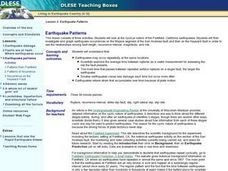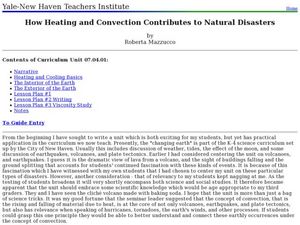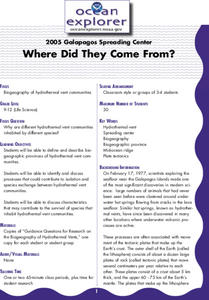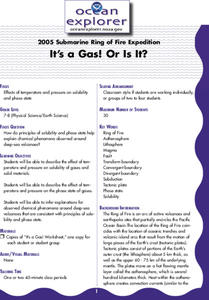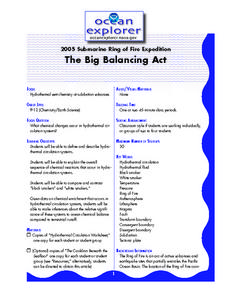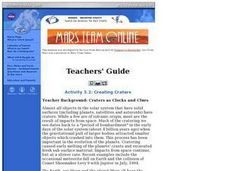Curated OER
Marine Animals: Stranded on the Coast
Students identify marine animals that could become stranded due to coastal features and currents. They plot data on worksheets for locations of sea turtles actually beached or stranded. After plotting their points, they hypothesize...
Curated OER
Virginia Rocks and Minerals
Students explore, via a CD-ROM, the Virginia's five geological regions and discover the rocks and minerals located in each. In stone kits, they examine samples of rocks and minerals and answer questions about them. After discovering the...
Curated OER
Northwest Hawaiian Islands
Students compare and contrast places around the world. Students analyze the effects of human activity on the physical environment and devise plans to address the consequences. Students also focus on geographical topics such as formation...
Curated OER
Geology Rocks
Middle schoolers discuss information relating to Illinois geology. They examine top mineral resources in Illinois to find detailed information about geodes and where they can be found. Students complete geode lab to explore external...
Curated OER
"What If The Earth Were Made Of Sand
Students examine the most common characteristics of clay and sand, and to understand how the properties of these materials affect the erosion of the landscape and the formation of the many landforms. They explore clay and sand through...
Curated OER
Earthquakes and Seismic Waves
Learners explore earthquakes and seismic waves. They investigate how energy is released in the subsurface to create seismic waves. Students explore the inner workings of a seismograph and how they are used to determine the location of an...
Curated OER
Vocab-u-lous! Build a Fabulous Vocab
In this vocabulary worksheet, students decipher the best word choice to complete the sentence. All words begin with the letter T.
National Science Teachers Association
Adopt-a-Dino
Earth historians research a specific dinosaur, write a paper about the Mesozoic era that it lived in, create an artistic rendition of the environment, and give a presentation in class about what they learned. Be aware that there are...
Curated OER
Australian Mammals: Evolutionary Development as a Result of Geographic Isolation
Students comprehend the difference between monotremes, marsupials, and placental mammals. They are able to compare and contrast these organisms (Australian mammals) with other mammals. Students are able to identify Australian mammals.
Curated OER
Building a Better Sentence
Sentence construction is both a science and an art. This bare bones lesson ties an analysis of earth's geology to sentence formation. Although referenced as a major part of the activity, there are no links to the technology or resources...
Curated OER
Earthquake Proof Structures
Eighth graders build a structure that is able to withstand a simulated earthquake. They research earthquakes, earthquake measurement, and society's preparation for and reaction to them. Pupils build models and present them to the...
Curated OER
Feeling Hot, Hot, Hot!
Students study the different types of volcanoes and how they erupt. In this volcano lesson plan students identify where volcanoes are most prevalent and options for predicting eruptions.
Curated OER
Earthquake Patterns
Students identify and interpret the cyclical nature of the Parkfield, California earthquakes. They then investigate and graph earthquake occurrences on the Mojave segment of the San Andreas fault and then on the Hayward fault in order to...
Curated OER
How Heating and Convection Contributes to Natural Disasters
Students study the basics of heating and cooling and how it pertains to the earth. In this global lesson students read the Magic Tree House book then create a chart of their findings.
Curated OER
Know Your Boundaries: Earthquake Lessons in the Classroom
With all the recent attention on Haiti, and now Chile, it is the perfect time to teach your students about earthquakes!
Curated OER
Shake, Rattle and Roll
Sixth graders explore the causes and effects of earthquakes. They also collect and analyze data in graphs. They also use the Internet to research earthquakes
Curated OER
Fossil Fuels (III), The Geology of Coal: Interpreting Geologic History
Young scholars hypothesize about why various samples of coal have different characteristics. Pupils use information that they found during Internet searches to ascertain the validity of their hypotheses and verify the "story" of coal. ...
Curated OER
Where Did They Come From?
Students explain hydrothermal vents and the process in which species and the hydrothermal vents become isolated.
Curated OER
And Now for Something Completely Different...
Young scholars identify organisms that are typical a part of a hydrothermal vent. They examine why hydrothermal vents are short-lived.
Curated OER
Science Puzzlers, Twisters, and Teasers: The History of Life on Earth
A somewhat amusing assignment, this activity lists statements that an ancient organism may have made and asks learners to determine what geologic era that each may have lived in. It uses witty word puzzles and fill-in-the-blank-style...
Curated OER
It's a Gas! Or is it?
Students discover the principles of solubility and phase state and their influence on chemical phenomena observed around deep-sea volcanoes. They describe the effect of temperature and pressure on solubility of gasses and solid materials.
Curated OER
It Looks Like Champagne
Students determine some practical implications of the discovery of liquid carbon dioxide in deep-ocean ecosystems. They interpret phase diagrams and explain the meaning of "critical point" and "triple point."
Curated OER
The Big Balancing Act
Students describe chemical changes occurring in hydrothermal circulation systems. They make inferences about the significance of these systems to ocean chemical balance compared to terrestrial runoff.
Curated OER
Creating Craters
Students explore parts of an impact crater and compare and contrast craters found in Earth, the Moon, and Mars. Crater formation is modelled and the relationship of mass, velocity, and size of the projectile to the crater formation is...
Other popular searches
- Map of Tectonic Plates
- Floating Tectonic Plates
- Geography Tectonic Plates
- Pacific Basin Tectonic Plates
- Movement of Tectonic Plates
- Tectonic Plates Converge
- Tectonic Plates Move Apart
- Tectonic Plates Oranges
- Edible Tectonic Plates
- Tectonic Plates and Volcanoes














